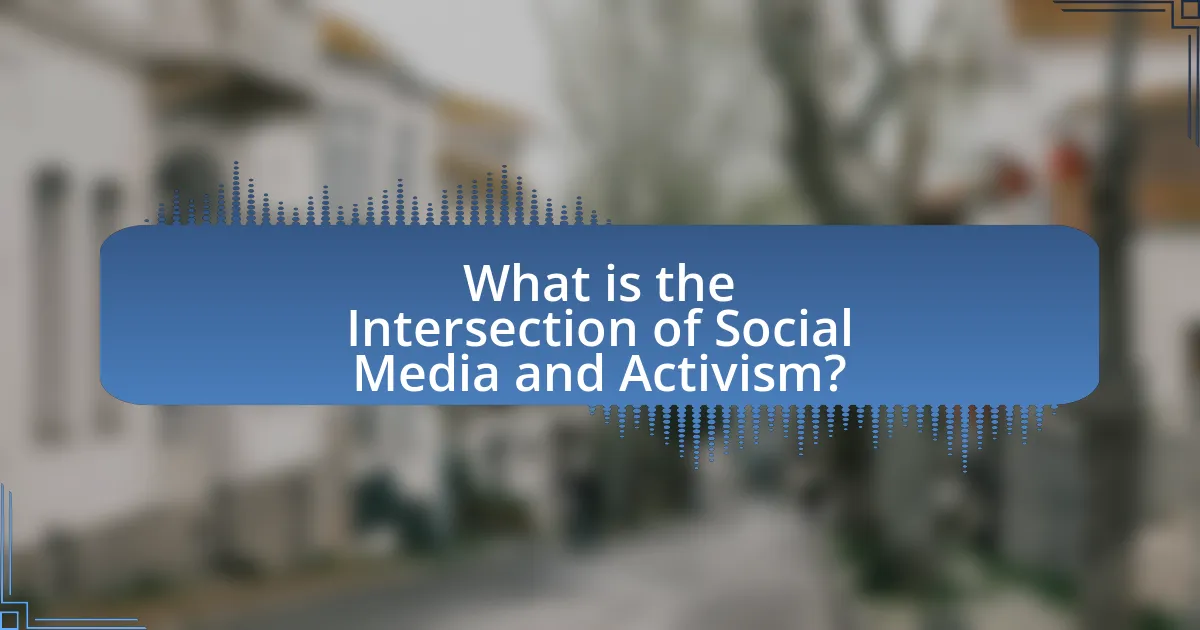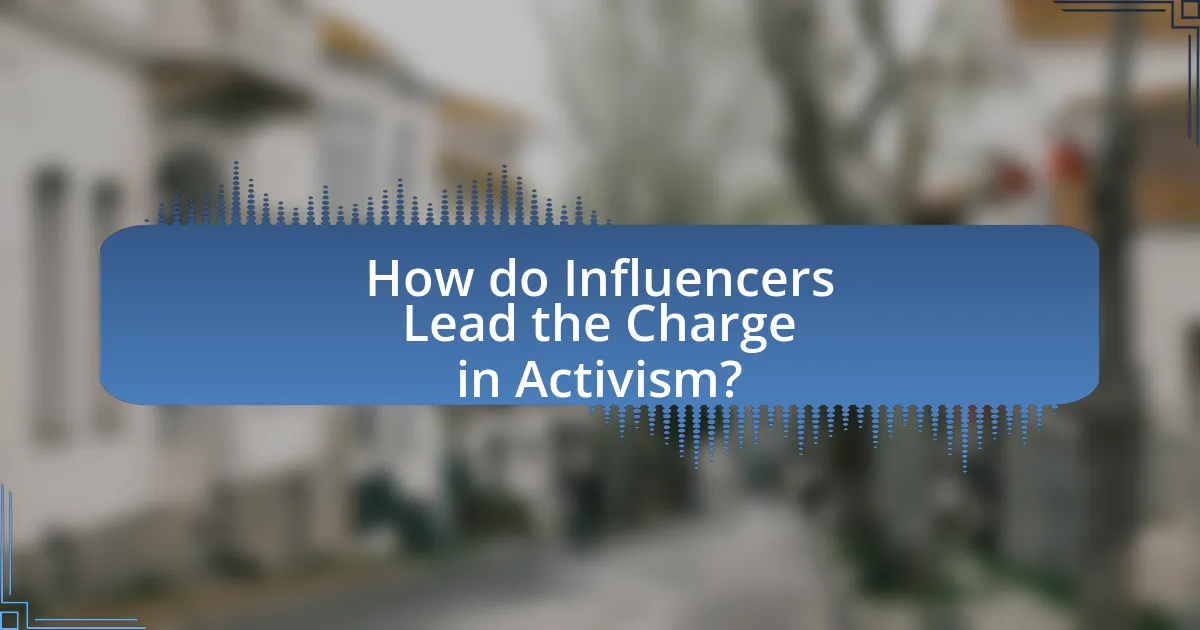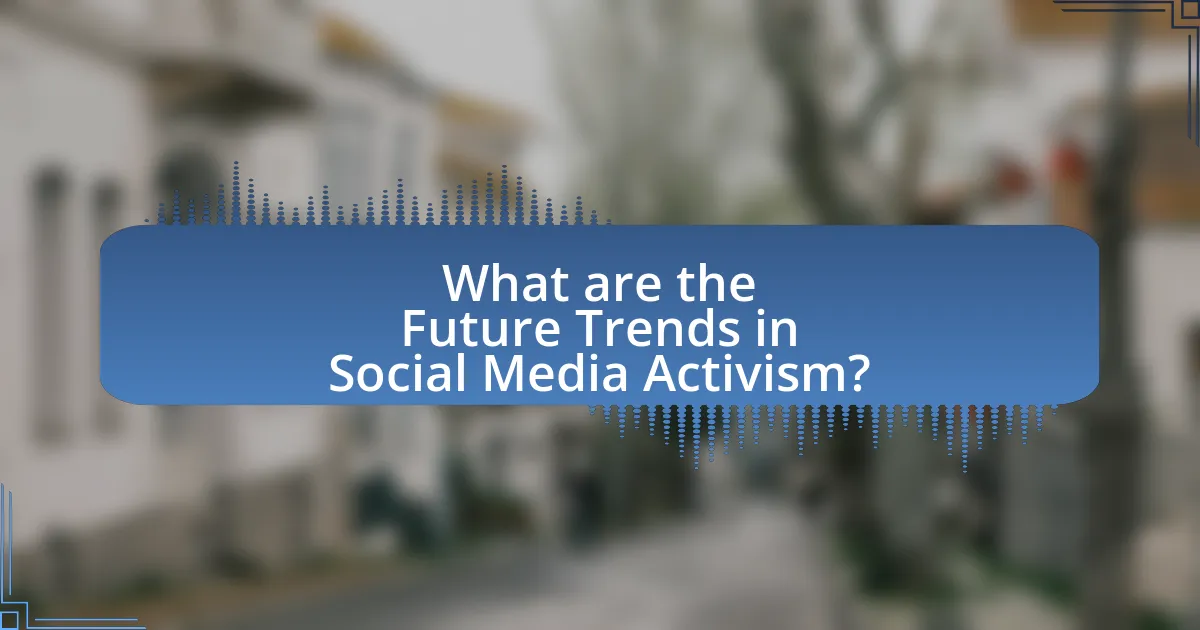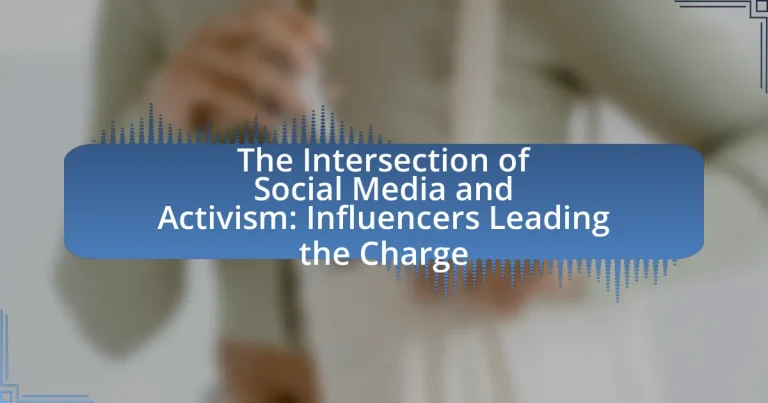The article examines the intersection of social media and activism, highlighting how digital platforms empower activists to mobilize support and drive social change. It discusses the transformation of traditional activism through rapid information dissemination, community building, and the unique impacts of various social media platforms. The role of influencers is emphasized, detailing how they amplify activist messages, engage audiences, and shape public perception of social issues. Additionally, the article addresses challenges faced by activists, such as misinformation and censorship, while exploring future trends in social media activism, including the influence of emerging technologies and best practices for responsible engagement.

What is the Intersection of Social Media and Activism?
The intersection of social media and activism is characterized by the use of digital platforms to mobilize support, raise awareness, and drive social change. Social media enables activists to reach a global audience quickly, facilitating the organization of movements such as Black Lives Matter and climate change protests. Research indicates that 79% of social media users believe these platforms are effective for activism, highlighting their role in amplifying marginalized voices and fostering community engagement.
How has social media transformed traditional activism?
Social media has transformed traditional activism by enabling rapid mobilization, broader reach, and enhanced engagement. Activists can now disseminate information instantly to a global audience, as seen during movements like the Arab Spring, where platforms like Twitter and Facebook played crucial roles in organizing protests and sharing real-time updates. This shift has allowed grassroots movements to gain visibility and support that would have been difficult to achieve through traditional media channels. Furthermore, social media facilitates direct interaction between activists and supporters, fostering community and collaboration, which has been evidenced by the success of campaigns such as #BlackLivesMatter, where online engagement translated into offline action and policy discussions.
What are the key features of social media that facilitate activism?
The key features of social media that facilitate activism include rapid information dissemination, community building, and engagement tools. Rapid information dissemination allows activists to share news and updates instantly, reaching a global audience; for example, during the Arab Spring, platforms like Twitter played a crucial role in mobilizing protests. Community building enables like-minded individuals to connect and organize, as seen in movements like Black Lives Matter, which utilized Facebook groups to foster solidarity. Engagement tools, such as hashtags and live streaming, enhance visibility and participation, exemplified by the #MeToo movement, which gained momentum through widespread social media engagement. These features collectively empower activists to amplify their messages and mobilize support effectively.
How do social media platforms differ in their impact on activism?
Social media platforms differ in their impact on activism primarily through their audience reach, engagement mechanisms, and content formats. For instance, Twitter facilitates rapid dissemination of information and mobilization through hashtags, making it effective for real-time activism, as seen during the Arab Spring where tweets played a crucial role in organizing protests. In contrast, Instagram’s visual-centric approach fosters emotional connections and storytelling, which can enhance awareness and support for causes, exemplified by campaigns like #BlackLivesMatter that utilize powerful imagery to convey messages. Facebook, with its community-building features, allows for in-depth discussions and event organization, which can sustain long-term activism efforts, as demonstrated by various grassroots movements that have successfully mobilized local communities. Each platform’s unique characteristics shape how activists communicate, engage supporters, and ultimately influence social change.
Why is the role of influencers significant in this intersection?
The role of influencers is significant in the intersection of social media and activism because they possess the ability to amplify messages and mobilize audiences effectively. Influencers leverage their large followings to raise awareness about social issues, thereby driving engagement and action among their followers. For instance, during the Black Lives Matter movement, influencers like Kim Kardashian and LeBron James used their platforms to advocate for racial justice, resulting in increased visibility and support for the cause. This demonstrates that influencers can shape public discourse and encourage collective action, making them pivotal in the realm of social activism.
What defines an influencer in the context of social media activism?
An influencer in the context of social media activism is defined as an individual who leverages their online presence and audience to promote social change and raise awareness about specific issues. These influencers often possess a significant following on platforms such as Instagram, Twitter, or TikTok, which they utilize to mobilize support, disseminate information, and engage their audience in activism. For instance, influencers like Greta Thunberg have effectively used social media to advocate for climate action, demonstrating the power of their platforms to influence public opinion and drive collective action.
How do influencers amplify activist messages?
Influencers amplify activist messages by leveraging their large followings and engagement on social media platforms to reach a broader audience. They create content that resonates with their followers, often using storytelling, visuals, and personal experiences to highlight social issues. For instance, a study by the Pew Research Center found that 72% of teens use Instagram, making it a powerful platform for influencers to promote activism. By collaborating with non-profit organizations and participating in campaigns, influencers can mobilize their audience to take action, such as signing petitions or donating to causes. This strategic use of social media not only raises awareness but also fosters community engagement around important social issues.
What challenges do activists face on social media?
Activists face significant challenges on social media, including misinformation, censorship, and online harassment. Misinformation can undermine their messages and create confusion among supporters, as seen during various social movements where false narratives spread rapidly. Censorship by platforms can limit the visibility of their content, particularly when discussing sensitive topics, which has been documented in cases where posts are flagged or removed. Additionally, online harassment poses a serious threat, with many activists receiving threats or targeted attacks, which can deter participation and silence voices. These challenges collectively hinder the effectiveness of activism on social media platforms.
How does misinformation affect social media activism?
Misinformation significantly undermines social media activism by spreading false narratives that can mislead audiences and dilute the effectiveness of genuine movements. For instance, during the Black Lives Matter protests in 2020, misinformation regarding events and figures involved led to confusion and division among supporters, ultimately hindering collective action. Studies show that misinformation can decrease trust in legitimate sources, making it harder for activists to mobilize support and achieve their goals. This dynamic illustrates how false information can create obstacles for social movements, diverting attention from critical issues and impeding progress.
What are the risks of censorship for activists on social media platforms?
Censorship poses significant risks for activists on social media platforms, primarily by limiting their ability to communicate and mobilize support. When social media companies restrict or remove content, activists may lose vital channels for raising awareness about social issues, which can hinder their advocacy efforts. For instance, a report by the Electronic Frontier Foundation highlights that over 70% of activists have experienced content removal or account suspension, directly impacting their outreach and engagement. Additionally, censorship can create a chilling effect, discouraging individuals from expressing dissenting opinions due to fear of repercussions, thereby stifling public discourse and reducing the diversity of viewpoints in social movements.

How do Influencers Lead the Charge in Activism?
Influencers lead the charge in activism by leveraging their extensive social media reach to raise awareness and mobilize support for various causes. They utilize platforms like Instagram, Twitter, and TikTok to share impactful messages, engage their followers, and create viral campaigns that can significantly amplify social issues. For instance, during the Black Lives Matter movement, influencers such as Naomi Osaka and LeBron James used their platforms to advocate for racial justice, resulting in increased visibility and support for the movement. Their ability to connect with large audiences enables them to drive conversations, influence public opinion, and encourage action, making them pivotal figures in contemporary activism.
What strategies do influencers use to engage their audience in activism?
Influencers engage their audience in activism through strategies such as storytelling, leveraging social media platforms, and creating interactive content. Storytelling allows influencers to share personal experiences related to social issues, making the cause relatable and emotionally impactful. For instance, influencers often use platforms like Instagram and TikTok to share compelling narratives that resonate with their followers, fostering a sense of community and urgency around the cause. Additionally, influencers utilize social media features like polls, Q&A sessions, and live streams to encourage audience participation and dialogue, which enhances engagement and mobilizes action. Research indicates that posts featuring personal stories can increase engagement rates by up to 300%, demonstrating the effectiveness of these strategies in driving activism.
How do influencers create compelling content for social causes?
Influencers create compelling content for social causes by leveraging their platforms to raise awareness, engage audiences, and inspire action. They utilize storytelling techniques, personal experiences, and emotional appeals to connect with their followers on a deeper level. For instance, influencers often share impactful narratives or testimonials related to the cause, which can significantly enhance relatability and urgency. Research indicates that emotional storytelling can increase audience engagement by up to 50%, making it a powerful tool for advocacy. Additionally, influencers frequently collaborate with non-profit organizations to ensure their content is authentic and aligned with the cause, further enhancing credibility and trust among their audience.
What role does authenticity play in an influencer’s activism?
Authenticity is crucial in an influencer’s activism as it fosters trust and credibility among their audience. When influencers genuinely align their actions and messages with their personal beliefs and values, they are more likely to engage their followers effectively. Research indicates that 86% of consumers consider authenticity important when deciding which brands to support, highlighting the impact of perceived sincerity on audience engagement. Furthermore, influencers who share personal stories or experiences related to their activism can create a deeper emotional connection, making their advocacy more relatable and impactful. This connection enhances the likelihood of mobilizing their audience towards social change, demonstrating that authenticity is not just beneficial but essential for successful activism in the digital age.
How do influencers collaborate with organizations and movements?
Influencers collaborate with organizations and movements by leveraging their social media platforms to amplify messages, raise awareness, and mobilize their audiences. This collaboration often involves sponsored content, where influencers create posts or videos that promote the organization’s mission or campaigns, effectively reaching a wider audience. For example, in 2020, influencers played a significant role in promoting the Black Lives Matter movement, using their platforms to share educational resources and encourage followers to participate in protests and donate to related causes. This demonstrates how influencers can drive engagement and support for social movements through strategic partnerships with organizations.
What are the benefits of partnerships between influencers and activist organizations?
Partnerships between influencers and activist organizations enhance visibility and amplify messages, leading to greater awareness of social issues. Influencers possess large, engaged audiences that can be mobilized for advocacy, increasing the reach of activist campaigns. For instance, a study by the Pew Research Center found that 72% of teens use social media, making it a powerful platform for spreading awareness. Additionally, influencers can lend credibility to causes, as their endorsements often resonate with followers, fostering trust and encouraging action. This synergy not only drives engagement but also facilitates fundraising efforts, as seen in campaigns where influencers have successfully raised significant amounts for various causes.
How do influencers help in fundraising for social causes?
Influencers help in fundraising for social causes by leveraging their large online followings to raise awareness and drive donations. They create engaging content that highlights specific issues, often sharing personal stories or experiences that resonate with their audience. For instance, a study by the Pew Research Center found that 70% of teens trust influencers more than traditional celebrities, making influencer endorsements particularly effective in mobilizing support. Additionally, influencers often collaborate with charities to host fundraising events or campaigns, utilizing platforms like Instagram and TikTok to reach a broader audience and encourage participation. This combination of trust, reach, and engagement significantly enhances fundraising efforts for various social causes.
What impact do influencers have on public perception of social issues?
Influencers significantly shape public perception of social issues by leveraging their platforms to raise awareness and drive engagement. Their ability to reach large audiences allows them to highlight specific causes, often leading to increased visibility and discussion around those issues. For instance, a study by the Pew Research Center found that 70% of teens trust influencers more than traditional celebrities, indicating that influencers can effectively sway opinions and mobilize support for social causes. This influence is further amplified when influencers share personal stories or experiences related to social issues, fostering a sense of relatability and urgency among their followers.
How do influencers shape narratives around social justice movements?
Influencers shape narratives around social justice movements by leveraging their platforms to amplify marginalized voices and raise awareness about critical issues. They utilize storytelling, visual content, and personal experiences to engage their audiences, making complex social issues more relatable and accessible. For instance, during the Black Lives Matter movement, influencers like Kim Kardashian and LeBron James used their reach to advocate for racial justice, mobilizing millions to participate in protests and support legislative changes. Their ability to create viral content and foster community discussions significantly impacts public perception and can lead to increased activism and policy change.
What metrics can be used to measure the effectiveness of influencer-led activism?
Metrics to measure the effectiveness of influencer-led activism include engagement rates, reach, conversion rates, sentiment analysis, and social media mentions. Engagement rates, which encompass likes, shares, and comments, indicate how actively the audience interacts with the content. Reach measures the total number of unique users who see the influencer’s posts, reflecting the campaign’s visibility. Conversion rates assess the percentage of users who take a desired action, such as signing a petition or donating, demonstrating the campaign’s impact on behavior. Sentiment analysis evaluates the emotional tone of comments and discussions surrounding the activism, providing insight into public perception. Lastly, social media mentions track how often the campaign is referenced across platforms, indicating its overall influence and relevance. These metrics collectively provide a comprehensive view of the effectiveness of influencer-led activism.

What are the Future Trends in Social Media Activism?
Future trends in social media activism include the rise of decentralized platforms, increased use of artificial intelligence for targeted messaging, and a focus on intersectionality in campaigns. Decentralized platforms, such as Mastodon, are gaining traction as users seek alternatives to mainstream social media, allowing for more diverse voices and less corporate influence. The integration of AI enables activists to analyze data and tailor messages to specific audiences, enhancing engagement and effectiveness. Additionally, campaigns are increasingly addressing multiple social justice issues simultaneously, reflecting a broader understanding of how various forms of oppression intersect. These trends indicate a shift towards more inclusive, data-driven, and decentralized approaches in social media activism.
How is technology evolving the landscape of social media activism?
Technology is evolving the landscape of social media activism by enhancing communication, mobilization, and engagement among activists. The rise of platforms like Twitter, Instagram, and TikTok allows for rapid dissemination of information, enabling movements to gain traction quickly. For instance, the Black Lives Matter movement utilized hashtags and viral videos to raise awareness and organize protests, demonstrating the power of social media in amplifying voices and fostering community support. Additionally, advancements in live streaming and real-time updates facilitate immediate responses to events, further mobilizing supporters. According to a Pew Research Center study, 69% of U.S. adults believe social media is an effective tool for activism, highlighting its significant role in shaping public discourse and driving social change.
What role will emerging platforms play in activism?
Emerging platforms will significantly enhance activism by providing new avenues for communication, mobilization, and community building. These platforms facilitate real-time information sharing, allowing activists to quickly disseminate messages and organize events, as seen during movements like Black Lives Matter, where Twitter and Instagram played crucial roles in spreading awareness and rallying support. Additionally, emerging platforms often attract younger audiences, increasing engagement and participation in social causes, which is evidenced by the rise of TikTok as a space for activism, where users create viral content to raise awareness on issues such as climate change and social justice.
How might artificial intelligence influence activist strategies on social media?
Artificial intelligence may significantly enhance activist strategies on social media by enabling targeted messaging and data analysis. AI algorithms can analyze vast amounts of social media data to identify trends, sentiments, and key influencers, allowing activists to tailor their campaigns more effectively. For instance, a study by the Pew Research Center found that social media platforms utilize AI to optimize content delivery, which can amplify activist messages to specific demographics, increasing engagement and support. Additionally, AI tools can automate content creation and dissemination, making it easier for activists to maintain a consistent online presence and respond rapidly to emerging issues.
What best practices should influencers follow in their activism efforts?
Influencers should prioritize authenticity, transparency, and engagement in their activism efforts. Authenticity ensures that influencers genuinely believe in the causes they promote, which fosters trust among their audience. Transparency involves openly sharing their motivations, funding sources, and potential conflicts of interest, which enhances credibility. Engagement with their followers through discussions, Q&A sessions, and collaborative initiatives encourages community involvement and amplifies the impact of their activism. Research indicates that 70% of consumers are more likely to support brands and individuals who demonstrate transparency in their actions (Edelman Trust Barometer, 2021). By adhering to these best practices, influencers can effectively leverage their platforms for meaningful social change.
How can influencers ensure their activism is impactful and responsible?
Influencers can ensure their activism is impactful and responsible by aligning their messages with verified information and engaging in transparent communication. By utilizing credible sources and fact-checking their claims, influencers can build trust with their audience, which is essential for effective activism. Research indicates that misinformation can undermine social movements; for instance, a study published in the journal “Science” found that false information spreads faster than the truth on social media platforms. Additionally, influencers should actively listen to the communities they represent, ensuring that their activism reflects the voices and needs of those directly affected by the issues. This approach fosters authenticity and accountability, making their efforts more meaningful and effective.
What are common pitfalls influencers should avoid in social media activism?
Common pitfalls influencers should avoid in social media activism include performative activism, lack of authenticity, and failure to engage with the community. Performative activism occurs when influencers post about social issues without genuine commitment, which can lead to backlash and accusations of insincerity. Lack of authenticity undermines trust; followers expect influencers to align their actions with their stated beliefs. Additionally, failing to engage with the community can result in a disconnect from the very issues influencers aim to address, making their efforts less impactful. Research indicates that authentic engagement significantly enhances the effectiveness of activism on social media platforms.


